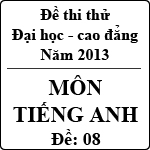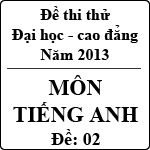Đề thi thử Đại học năm 2013 – môn Tiếng Anh (Khối D – Đề 09), Đề thi thử Đại học năm 2013 – môn Tiếng Anh (Khối D – Đề 09)
ĐỀ THI THỬ ĐẠI HỌC NĂM 2012 – 2013
MÔN THI: TIẾNG ANH – KHỐI: D
Thời gian làm bài: 90 phút, không kể thời gian phát đề
Đề số 09
Mark the letter A, B, C or D on your answer sheet to indicate the correct answer that best completes each unfinished sentence, substitutes the underlined part, or has a close meaning to the original one
Question 1: ……….. be needed, the water basin would need to be dammed.
A. Hydroelectric power should
C. Hydroelectric power
B. When hydroelectric power
D. Should hydroelectric power
Question 2: The replacement of shops such as the groceries’ and chemist’s by cafes………….. the housewives with insufficient facilities for shopping.
A. leave B. have left C. has left D. to have left
Question 3: Deborah is going to take extra lessons to………. what she missed while she was away.
A. catch up on B. cut down on C. put up with D. take up with
Question 4: Jane: Thank you for a lovely evening.
Barbara: ………………………………
A. You are welcome B. Have a good day C. Thanks D. Cheer!
Question 5: I have English classes …………day – on Mondays, Wednesdays and Fridays.
A. all other B. each other C. every other D. this and the other
Question 6: She was ………………she could not say anything.
A. so surprised at the news that
C. so surprised of the news that
B. such surprised at the news that
D. so that surprised for the news
Question 7: There is a huge amount of ………associated with children’s TV shows nowadays.
A. produce B. manufacturing C. merchandising D. sales
Question 8: British and Australian people share the same language, but in other respects they are as different as ………..
A. cats and dogs B. chalk and cheese C. salt and pepper D. here and there
Question 9: It’s essential that every student …………the exam before attending the course.
A. pass B. passes C. would pass D. passed
Question 10: I decided to go to the library as soon as I…………….
A. finish what I did
C. finished what I did
B. would finish what I did
D. finished what I was doing
Question 11: ………………..in the street yesterday was very friendly.
A. The mounted police, who I saw
C. Who is the mounted police I saw
B. The mounted police I saw whom
D. The mounted police whom I saw
Question 12: A washing machine of this type will certainly………….normal domestic use.
A. stand up for B. come up with C. get on to D. take down with
Question 13: “Please speak up a bit more, Jason. You’re hardly loud enough to be heard from the back”, the teacher said.
A. visible B. audible C. edible D. eligible
Question 14: Ancient Egyptians mummified their dead through the use of chemicals, …………. ancient Peruvians did through natural processes.
A. because B. whereas C. even though D. whether or not
Question 15: It is very difficult to…………the exact meaning of an idiom in a foreign language.
A. convert B. convey C. exchange D. transfer
Question 16: Issues from price, place, promotion, and product are………….of marketing strategies planning, despite growing calls to expand the range of issues in today’s more complex world.
A. these that are among the most conventional concerns
B. among the most conventional concerns
C. they are among the most conventional concerns
D. those are among the most conventional concerns
Question 17: Please cut my hair …………….the style in this magazine.
A. the same length as B. the same length like C. the same long like D. the same long as
Question 18: Carbon dioxide may be absorbed by trees or water bodies, or it may stay in the atmosphere when………., while it is only in the atmosphere that chlorofluorocarbons find their home.
A. by releasing emissions from cars
C. cars that release emissions
B. released from car emissions
D. emissions are released by cars
Question 19: Half of the children were away from school last week because of……..of influenza.
A. a break- out B. a breakthrough C. an outburst D. an outbreak
Question 20: A: This grammar test is the hardest one we’ve ever had this semester!
B: …………………but I think it’s quite easy.
A. I couldn’t agree more.
C. You’re right.
B. I understand what you’re saying.
D. I don’t see in that way.
Question 21: So little………….about mathematics that the lecture was completely beyond me.
A. I have known B. I knew C. do I know D. did I know
Question 22: It’s a formal occasion so we’ll have to…….to the nines- no jeans and pullovers this time!
A. hitch up B. put on C. wear in D. get dressed up
Question 23: …………so aggressive, we’d get on much better.
A. She was not B. Had she not C. Weren’t she D. If she weren’t
Question 24: On the second thought, I believe I will go with you to the theater.
A. Upon reflection
C. For this time only
B. After discussing with my wife
D. For the second time
Question 25: A: …………………………………….
B: Oh, thank you. I just got it yesterday.
A. When have you got this beautiful dress?
C. You’ve just bought this beautiful dress, haven’t you?
B. How a beautiful dress you’re wearing!
D. That’s a beautiful dress you have on!
Question 26: I studied English for four years in high school. …………… had trouble talking with people when I was traveling in the US.
A. Therefore, I B. Otherwise, I C. Although I D. However, I
Question 27: ………….in the atmosphere is the temperature falling below freezing.
A. Frost is produced
C. What produces frost
B. Frost produces
D. What is frost produced
Question 28: All………….is a continuous supply of the basic necessities of life.
A. what is needed B. for our needs C. the thing needed D. that is needed
Question 29: He said that the plane had already left and that I…………………an hour earlier.
A. Must have arrived
C. should have arrived
B. had to arrive
D. was supposed to arrive
Question 30: There seems to be a large ………. between the number of people employed in service industries, and those employed in the primary sectors.
A. discriminate B. discretion C. discrepancy D. distinguish
Read the following passage and mark the letter A, B, C or D on your answer sheet to indicate the correct word or phrase for each of the blanks from 31- 40
COULD COMPUTER GAMES BE GOOD FOR YOU AFTER ALL
In Britain, the average young person now spends more money on games each year than on going to the cinema or renting videos. But is this……..31……a bad thing? For years, newspaper reports have been ………32….. that children who spend too much time playing computer games become unsociable, bad- tempered, even violent as a……..33…… But new research,……34…… out in both Europe and the USA, suggests that the opposite may be true.
Indeed, playing some of the more complicated games may help people of all ages to improve certain skills. Researchers claim that this is because the games………35……the brain work harder in certain ways, like……..36……sounds and movements quickly and identifying what they are. The fact that people play the games repeatedly……..37…….. that they get a lot of practice in these skills which are therefore likely to become highly developed.
Social skills may benefit, too. Researchers in Chicago think that fans of first- person shooter games……38…… “Counterstrike” are better than non-players when it comes to building trust and co-operation, and that this……..39……them to make good friendships and become strong members of their communities. So rather than……..40…….up computer games, perhaps young people need to spend more time on them?
| Question 31. Question 32. Question 33. Question 34. Question 35. Question 36. Question 37. Question 38. Question 39. Question 40. |
A. necessarily A. speaking A. product A. worked A. make A. realizing A. means A. in order to A. supports A. giving |
B. certainly B. informing B. result B. thought B. force B. noticing B. asks B. such as B. helps B. ending |
C. fully C. telling C. reason C. turned C. push C. imagining C. brings C. due to C. shows C. taking |
D. nearly D. saying D. conclusion D. carried D. keep D. solving D. causes D. as well as D. serves D. stopping |
Read the following passage and mark the letter A, B, C or D on your answer sheet to indicate the correct answer to each of the questions from 41 to 50
A number of factors related to the voice reveal the personality of the speaker.
The first is the broad area of communication, which includes imparting information by use of language, communicating with a group or an individual and specialized communication through performance. A person conveys thoughts and ideas through choice of words, by a tone of voice that is pleasant or unpleasant, gentle or harsh, by the rhythm that is inherent within the language itself, and by speech rhythms that are flowing and regular or uneven and hesitant, and finally, by the pitch and melody of the utterance. When speaking before a group, a person’s tone may indicate uncertainty or fright, confidence or calm. At interpersonal levels, the tone may reflect ideas and feelings over and above the words chosen, or may belie them. Here the participant’s tone can consciously or unconsciously reflect intuitive sympathy or antipathy, lack of concern or interest, fatigue, anxiety, enthusiasm or excitement, all of which are .usually discernible by the acute listener. Public performance is a manner of communication that is highly specialized with its own techniques for obtaining effects by voice and /or gesture. The motivation derived from the text, and in the case of singing, the music, in combination with the performer’s skills, personality, and ability to create empathy will determine the success of artistic, political, or pedagogic communication.
Second, the voice gives psychological clues to a person’s self-image, perception of others, and emotional health. Self-image can be indicated by a tone of voice that is confident, pretentious, shy, aggressive, outgoing, or exuberant, to name only a few personality traits. Also the sound may give a clue to the facade or mask of that person, for example, a shy person hiding behind an overconfident front. How a speaker perceives the listener’s receptiveness, interest, or sympathy in any given conversation can drastically alter the tone of presentation, by encouraging or discouraging the speaker. Emotional health is evidenced in the voice by free and melodic sounds of the happy, by constricted and harsh sound of the angry, and by dull and lethargic qualities of the depressed.
Question 41. What does the passage mainly discuss?
A. The function of the voice in performance
C. The connection between voice and personality
B. Communication styles
D. The production of speech
Question 42. What does the author mean by staring that, “At interpersonal levels, tone may reflect ideas and feelings over and above the words chosen” in lines 8- 9?
A. Feelings are expressed with different words than ideas are.
B. The tone of voice can carry information beyond the meaning of words.
C. A high tone of voice reflects an emotional communication.
D. Feelings are more difficult to express than ideas.
Question 43. The word “Here” in line 9 refers to……………
A. interpersonal interactions B. the tone C. ideas and feelings D. words chosen
Question 44. The word “derived” in line 13 is closest in meaning to………
A. discussed B. prepared C. registered D. obtained
Question 45. Why does the author mention “artistic, political, or pedagogic communication” in line 14-15?
A. As examples of public performance
B. As examples of basic styles of communication
C. To contrast them to singing
D. To introduce the idea of self-image
Question 46. According to the passage, an exuberant tone of voice may be an indication of a person’s………
A. general physical health B. personality C. ability to communicate D. vocal quality
Question 47. According to the passage, an overconfident front may hide…………
A. hostility B. shyness C. friendliness D. strength
Question 48. The word “drastically” in line 21 is closest in meaning to……………
A. frequently B. exactly C. severely D. easily
Question 49. The word “evidenced” in line 22 is closest in meaning to……………
A. questioned B. repeated C. indicated D. exaggerated
Question 50. According to the passage, what does a constricted and harsh voice indicate?
A. Lethargy B. Depression C. Boredom D. Anger
Download tài liệu để xem thêm chi tiết











